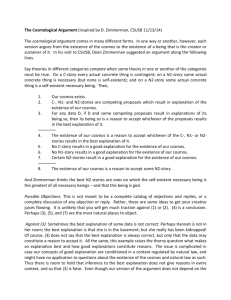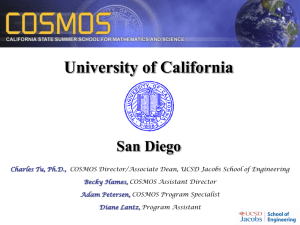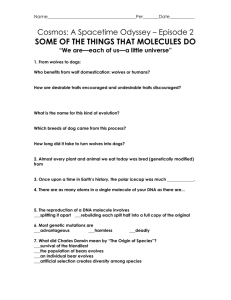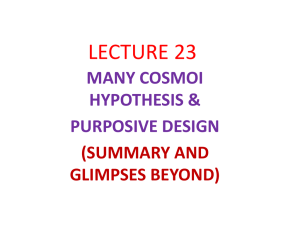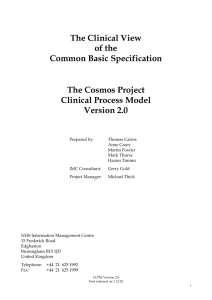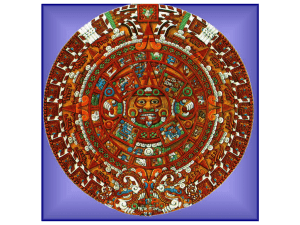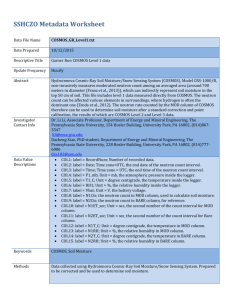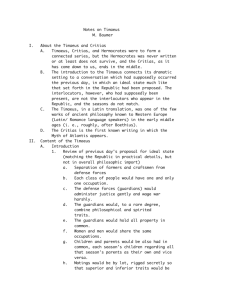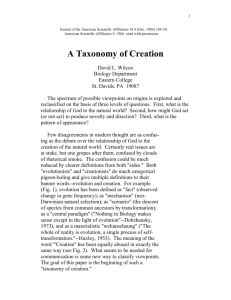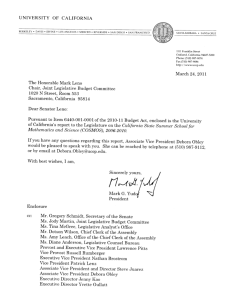FIS-Observer
advertisement
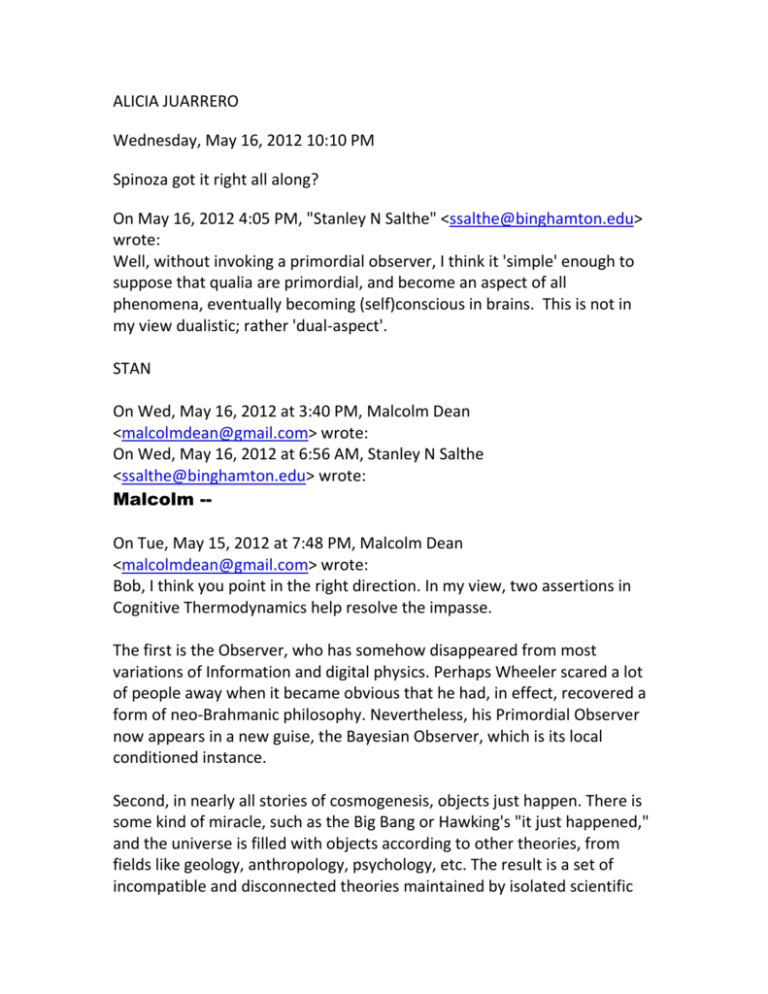
ALICIA JUARRERO Wednesday, May 16, 2012 10:10 PM Spinoza got it right all along? On May 16, 2012 4:05 PM, "Stanley N Salthe" <ssalthe@binghamton.edu> wrote: Well, without invoking a primordial observer, I think it 'simple' enough to suppose that qualia are primordial, and become an aspect of all phenomena, eventually becoming (self)conscious in brains. This is not in my view dualistic; rather 'dual-aspect'. STAN On Wed, May 16, 2012 at 3:40 PM, Malcolm Dean <malcolmdean@gmail.com> wrote: On Wed, May 16, 2012 at 6:56 AM, Stanley N Salthe <ssalthe@binghamton.edu> wrote: Malcolm -On Tue, May 15, 2012 at 7:48 PM, Malcolm Dean <malcolmdean@gmail.com> wrote: Bob, I think you point in the right direction. In my view, two assertions in Cognitive Thermodynamics help resolve the impasse. The first is the Observer, who has somehow disappeared from most variations of Information and digital physics. Perhaps Wheeler scared a lot of people away when it became obvious that he had, in effect, recovered a form of neo-Brahmanic philosophy. Nevertheless, his Primordial Observer now appears in a new guise, the Bayesian Observer, which is its local conditioned instance. Second, in nearly all stories of cosmogenesis, objects just happen. There is some kind of miracle, such as the Big Bang or Hawking's "it just happened," and the universe is filled with objects according to other theories, from fields like geology, anthropology, psychology, etc. The result is a set of incompatible and disconnected theories maintained by isolated scientific communities. It's amazing to note that objects and object-creation have only recently attracted the attention of philosophers. This is an essential aspect of Peircean semiotics I respect Peirce just as I respect Darwin: As a Nineteenth Century genius. Just as Darwinians continue to hammer on his theory of Natural Animal Husbandry, while adjusting it around the edges and ignoring all kinds of advances in dynamics, so Peirce has attracted a community which, present company excepted, does little toward recognizing recent advances which may improve or contradict Peirce's theories. To me, the key danger in all semiotic approaches is essentialism. There is the idea that meaning can be communicated, when it obviously can not. See Pask's exclusion principle. Edward Fredkin (2007): 'the meaning of information is given by the processes that interpret it.' This is why, from the first Working Paper, I wrote that cognition is recognition. As Bayesian Observers, we infer the meaning of observed transformations in the world. But meaning is never transmitted. I answer semeiosis with Bayesian epidemiology. Cognitive Thermodynamics asserts that the end of a thermodynamic process is beyond entropy, it is an object at another ontological level. So, for example, Adler's sub-quantum thermodynamics produces quantum objects, the Big Bang produces astrophysical objects, the Bayesian Observer produces cognitive objects, cultural thermodynamics produces cultural and economic objects, and religious systems produce sacred objects. Object-creation is the function of Wheeler's Observer, which makes distinctions. The result is a simple, consistent, trans-disciplinary observerbased view which reveals the fundamental "driver" of dynamic hierarchical evolution, intelligence, and cognition. It eliminates the mind-body problem, shows that the concept of consciousness is misleading, and with its Bayesian extension (Jaynes), provides a natural logic for science. What is the source of the observer? STAN All systems of science begin with a miracle, even when they deny (as does Hawking) that they invoke a miracle. But even the "grand unified" theories, do not easily account for all phenomena, including the human heart. In Observer-Participancy, Distinctions are the fundamental contingencies which Bob mentions below. As Wheeler showed, they are pre-law, premathematics, and pre-logic. Laws, mathematics, and logic are emergent consequences. In this way, the Observer is primordial. In the language of ancient theological systems, it is omni-present, and omni-potent. The difference between Observer-based cosmogenesis and today's normal theories of cosmogenesis is consistency. There is no need for mind-body dualism, "consciousness," fundamental randomness, and the damaging separation of the sciences we suffer. Observer-Participancy is a complete and thoroughly consistent worldview which presents hierarchy, dynamic evolution, "mind," and object-creation as fundamental built-in givens. Like the cranberry juice commercial: "Give us just one miracle per cosmos, that's all we ask!" Malcolm Finally, as you know, this approach extends to formal definitions of religious systems, providing new ways to understand their logics and terminologies as dynamic Bayesian ontologies (see Corso's work on generalized image understanding). Many scientists have accepted the Christian propaganda which dismisses other religions as "polytheistic." In fact, we have texts from ancient Egypt which refer to one god, and even those religions which now advertise themselves as monotheistic have divine hierarchies. Many Christians believe in the Devil, which means they have, at minimum, a dualistic cosmology. Newton is often claimed by modern science, but he was deeply interested in ancient religion. He must have studied the Egyptian god Kheper, whose symbol is the dung beetle, an insect which rolls matter into spheres and pushes them along -- symbolism which could easily have suggested gravitation to Newton's fertile imagination. Malcolm Dean Member, Higher Cognitive Affinity Group, BRI Research Affiliate, Human Complex Systems, UCLA Member, BAFTA/LA On Tue, May 15, 2012 at 12:15 PM, Stanley N Salthe <ssalthe@binghamton.edu> wrote: ---------- Forwarded message ---------From: Bob Logan <logan@physics.utoronto.ca> Date: Tue, May 15, 2012 at 10:54 AM Subject: Re: [Fis] Stephen Wolfram discussing his ANKS in Reedit this Monday To: Gordana Dodig-Crnkovic <gordana.dodig-crnkovic@mdh.se> Cc: "fis@listas.unizar.es" <fis@listas.unizar.es>, Robert Ulanowicz <ulan@umces.edu> Dear Friends - please do not take the following critique as disrespectful but the following amusing thoughts came into my head as I read that the cosmos is engaged in computing and is a cosmic computer. During the age of polytheism the different aspects of the cosmos were at war with each other and the cosmos was a battleground. Then with monotheism the cosmos bifurcated into the good side with angels fluttering about God sitting on a throne and the cosmos was basically praying and doing all kinds of good things except for the fallen angels who stoked the fires of the inferno somewhere in the netherworld. Then came Newton or as Alexander Pope put it Nature and nature's laws lay hid in night; God said "Let Newton be" and all was light. Suddenly the cosmos was a machine, a clockworks, that God created, set in motion and the cosmos mechanically followed the Creator's law. My couplet for our current time with attribution to Alexander Pope is: Now we are in the brave new age of information God said "Let Turing be" and all was computation. Suddenly the cosmos has evolved into a cosmic-super-computer having evolved from the clockwork universe which had in turn evolved from the dual domain of God's heaven and the Devil's hell which had in turn evolved from the battleground of the gods. What's next. Well from biology we got the Gaia hypothesis, the earth as an organism. What would be the next step - yes you guessed it the Cosmic Organism. Just google "cosmic organism" and you will find some 20,200 hits. It does not stop there either - here are the following cosmoses as revealed by Google quantum cosmos - 194,000 hits string theory cosmos - 10,000 hits holographic cosmos - 2,200 hits black hole cosmos 20,200 In fact take any metaphor from science or technology and someone will have a theory how our cosmos operates as that technology or science metaphor. With the concept of the multiverse or multiple universes we are back to the polytheistic world since every universe will have its own God. My conclusion is that there is one cosmos with multiple ways of describing it each of which employs a particular metaphor. The computational universe is just one example in a long line of cosmic metaphors and as our science and technology evolves so will the metaphors to describe this cosmos of ours. with kind regards - Bob Logan On 2012-05-15, at 9:42 AM, Gordana Dodig-Crnkovic wrote: Dear Bob, I am not sure if I have right to reply, but you make a very important remark. The answer is: computing nature performs much more than existing computers. What is computable in computing nature is what nature is able to perform through its continuous changes. Dialectical processes are also typical in nature and thus in the framework of computing nature, those also are computations. In short the question is: what kind of computations are those dialectical processes? That is what we want to learn. All the best, Gordana -----Original Message----From: Robert Ulanowicz [mailto:ulan@umces.edu] Sent: den 15 maj 2012 15:36 To: Gordana Dodig-Crnkovic Cc: Bruno Marchal; fis@listas.unizar.es Subject: Re: [Fis] Stephen Wolfram discussing his ANKS in Reedit this Monday Quoting Gordana Dodig-Crnkovic <gordana.dodig-crnkovic@mdh.se>: 2. Whatever changes in the states of the physical world there are, we understand them as computation. Dear Gordana, I'm not sure I agree here. For much of what transpires in nature (not just in the living realm), the metaphor of the dialectic seems more appropriate than the computational. As you are probably aware, dialectics are not computable, mainly because their boundary value statements are combinatorically intractable (sensu Kauffman). It is important to note that evolution (which, as Chaisson contends, applies as well to the history of the cosmos [and even the symmetrical laws of force]) is driven by contingencies, not by laws. Laws are necessary and they enable, but they cannot entail. Regards, Bob Robert K. Logan Chief Scientist - sLab at OCAD Prof. Emeritus - Physics - U. of Toronto www.physics.utoronto.ca/Members/logan
